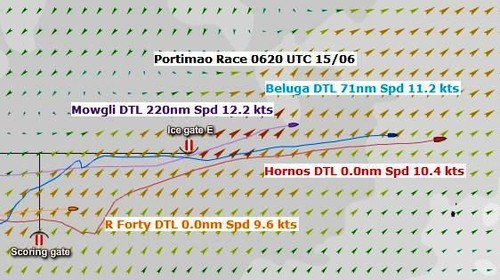Portimao Global Ocean Race leaders face confusing conditions
by Oliver Dewar on 15 Jun 2009

Race Tracker at 0620 UTC Monday 15 June as Desafio Cabo de Hornos leave the stronger breeze Portimao Global Ocean Race
http://www.portimaoglobaloceanrace.com
Shortly after midnight on Sunday, solo sailor Michel Kleinjans on Roaring Forty crossed the Portimão Global Ocean Race Leg 5 Scoring Gate south-east of Newfoundland and is currently averaging 9.6 knots 600 miles due west of the Azores.
While the Belgian single-hander is still pinned down by the Leg 5 Ice Limit at 41°N, the three double-handed boats in the fleet are now free of this restriction and are climbing north-east.
Having held the lead since the Leg 5 start in Charleston 11 days ago, Felipe Cubillos and José Muñoz are currently 120 miles north of Flores in the Azores Archipelago and in the 0620 UTC position poll on Monday morning (15/06), their red Class 40 Desafio Cabo de Hornos is 71 miles ahead of second place Boris Herrmann and Felix Oehme on Beluga Racer – representing a 22 mile gain for the Chilean team in the past 24 hours. In third place, 220 miles further west, the British duo of Jeremy Salvesen and David Thomson on Team Mowgli were in the strongest conditions on Sunday producing speed averages of 11-13.7 knots as the double-handed boats rode south-westerly breeze over the top of the Azores High.
This morning, as race leader Desafio Cabo de Hornos begins to ascend the western face of the Mid-Atlantic Ridge, Cubillos and Muñoz have slowed marginally from averages of 12 knots to ten knots as the Chileans leave the corridor of strong south-westerly breeze. Weather models suggest that Desafio Cabo de Hornos has around 15-17 knots of breeze while the Germans on Beluga Racer to the north-west have a couple of extra knots of wind and are making 11 knots – one knot faster than the Chilean team.
Currently averaging the fastest speed in the fleet of 12.2 knots, Salvesen and Thomson on Team Mowgli remain in the band of breeze with around 23 knots of south-westerly wind. For Michel Kleinjans, 330 miles south-west of the British team, the stronger breeze is out of reach although Roaring Forty has consistently polled speeds of between 9-10 knots since Sunday morning.
The next days are going to be crucial as the double-handed teams analyse the weather for the final 1,000 miles to the finish line in Portimão and the Chilean team are fully focused on conditions ahead. 'Throughout the 32,700 miles of this circumnavigation it has become very clear that meteorology is not an exact science,' states Felipe Cubillos. 'In fact, it is the opposite. Mankind has shown sublime arrogance in supposing that we can control and predict things without fault and that everything obeys a mathematical model,' he continues. 'The recent behaviour of financial institutions and the current economic disaster is an example of this failure. Very little follows a neat pattern.'
This distrust of mathematical models extends further than weather prediction. 'Consider if there was a supercomputer that could predict human behaviour in minute detail,' supposes Cubillos. 'Imagine this tool in the hands of a bureaucrat? George Orwell’s 1984 would be child’s play by comparison! It is presumptuous to accept that humans can control or predict events,' maintains the Chilean skipper. 'Believe me, meteorology is not an exact science and this morning we put ourselves completely in the hands of our weather team onshore.' Studying current weather files, there is a chance that the German team will benefit from the stronger breeze until Monday afternoon and the British on Team Mowgli could hold the highest speed averages until early on Tuesday while Kleinjans are Roaring Forty are likely to remain in 19 knots of breeze.
'You might think that the lead we have over the Germans is enough, but I assure you it isn’t,' warns Felipe Cubillos. 'We know that this advantage can vaporise in a matter of hours, so we’re preparing to do everything to stop this happening.' In a plea to his meteo team, the Chilean skipper provides an anecdote: 'Two friends went on a trip to Alaska hunting grizzly bears,' relates Cubillos. 'They couldn’t find any trace of bears, until one morning while they were having breakfast, a huge grizzly walks straight into their campsite. Immediately, one of the friends makes a quick escape, while the other dives into his tent and emerges with a pair of slippers. As the pair are running through the woods, the barefooted hunter asks: ‘What on earth are you doing with a pair of slippers when you know that a grizzly can run faster than any human being?’ To which his friend replies: ‘Oh yes, I know I haven’t a hope of outpacing the bear, but all I need is to be faster than you!’ So, that story summarises our request to our weather team,' adds Cubillos. 'We don’t need mathematical exactitude; just supply us with better information than the Germans!'
http://portimaorace.com
If you want to link to this article then please use this URL: www.sail-world.com/57896